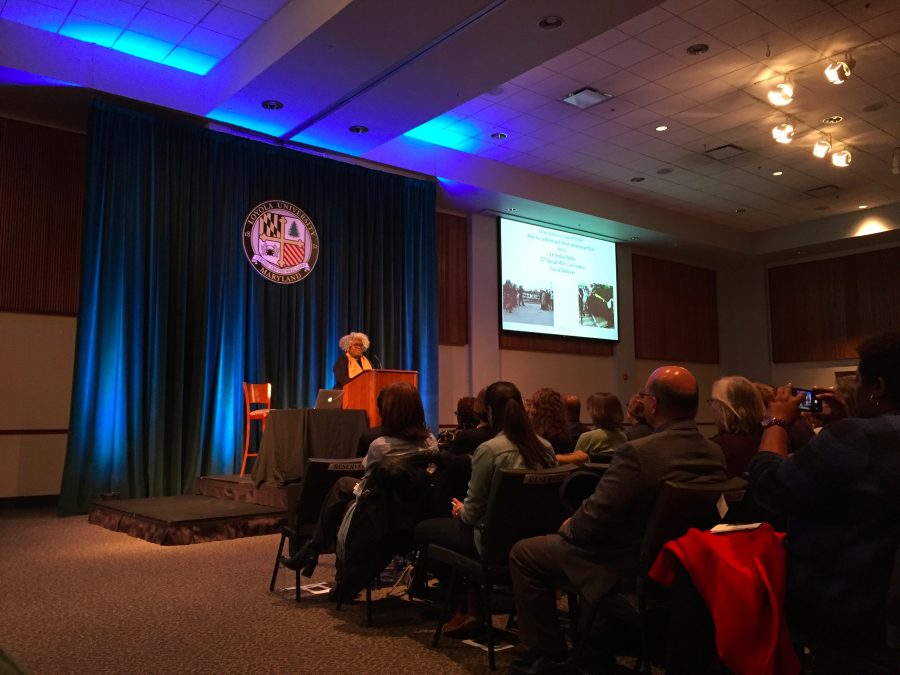On Jan.15, Loyola hosted its 25th annual Martin Luther King Jr. Convocation in McGuire Hall. The convocation honored the 50-year anniversary of Dr. King’s death, and provided an occasion for a discussion about racial injustice in our country. Dr. Anthea Butler, associate professor of religious studies and Africana studies at the University of Pennsylvania, presented a lecture titled, “From Selma to Charlottesville: How to confront and defeat racism in perilous times.”
President Rev. Brian F. Linnane introduced Butler. But first, he stressed the importance of discussing racial justice, especially during this time in American history.
Butler began her speech showing a short video of King speaking before the second Selma March on March 9, 1965. Three Unitarian ministers were brutally beaten during the march, resulting in the death of minister James Reeb.
Butler told the audience that she wanted them to understand what was happening during the Civil Rights Movement and how America has made little progress since then. Whether it be Selma in 1965, or Charlottesville in 2017, both events witnessed racism, violence, and death, and America has been witnessing racially motivated violence and death for well over 50 years.
With our country in such perilous times, Butler posed the question: How can Catholic social teachings help us? Butler discussed how King called on clergy members to march with them in Selma, hoping that the presence of numerous religious figures would add a moral core to the march and essentially equate racism to sin.
The support from religious figures so many decades ago prompted Butler to ask, “Where are the clergy today? How do we have students at Catholic schools shouting racial slurs on campus?”
For Butler, the answer is that we have forgotten we are Catholic and we have forgotten how to teach our children how to live and act justly with others. She cited a prank email that went out to hundreds of students on the University of Pennsylvania’s campus after the election, threatening to lynch them.
“How do we have students that think pranking like this is OK?” she asked.
Butler stated that we have forgotten to respect the life and dignity of the human person, that the “we” that God talks about is our community as a whole, and we have the responsibility to take care of it and all of God’s creations.
“We’ve missed this call,” she said. “Racism threatens our very way of life. The erosion of our society started with racial issues.”
Butler then outlined the hate incidents that occurred during the first three months of Donald Trump’s presidency, with the majority of victims being Jewish, black, LGBTQ, Muslim, and Latin American.
“If we keep going the way we are, we are doomed. If you remain quiet during these actions, you are part of the problem,” she said.
So how do we get through perilous times? Butler gave seven ways to help us do so, focusing on confronting and rebuilding ourselves and the community.
- Examine our conscience and the ways in which we participate in racism.
- Confront our racist attitudes and fears, since much of racism comes from the fear of the “other” or unknown.
- Choose when to speak and not to let our silence become betrayal.
- Be a community, as racism is a struggle for everyone, not just an individual.
- Commit to the less fortunate.
- Give time, money, and effort in service.
- Find time for rest since “we’ve been on a rollercoaster since June 15, when Trump announced his candidacy [for president],” she said,
She closed her lecture with another video of King speaking to a crowd and saying, “How long will we continue to wait? Not long. No lie can live forever.”
Butler used this video to remind the audience that the lie of racism can’t live forever, but that each of us needs to decide where and how we belong in America.
“There is no gray area where we are today. You need to hope for a future but you also have to help fight for it,” she said. “We are ready, and we must be ready to face the sin of racism.”
















































































































